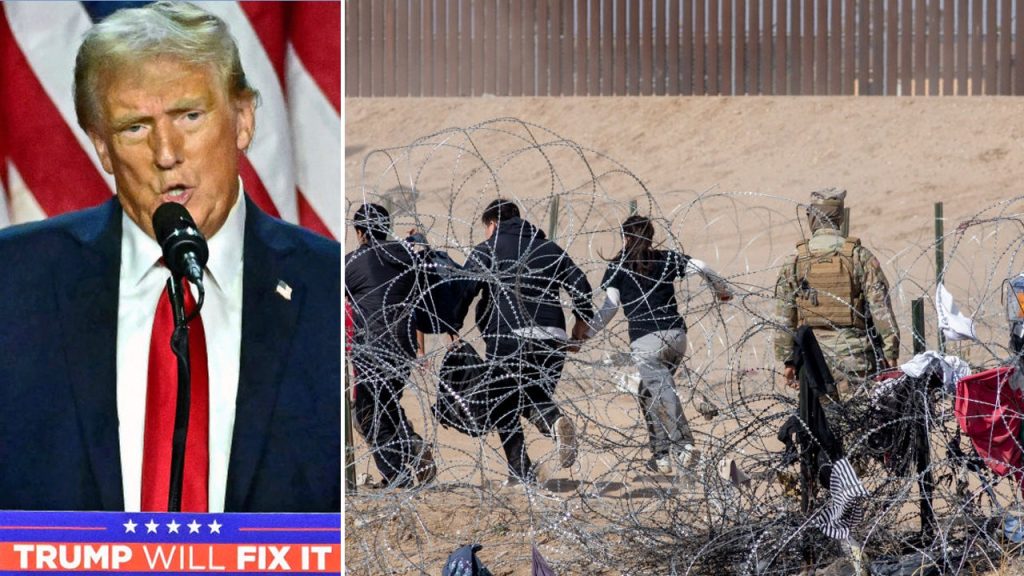In a significant move, President Donald Trump is expected to invoke the Alien Enemies Act of 1798 to facilitate the rapid deportation of illegal immigrants in the United States, specifically targeting the Venezuelan gang, Tren de Aragua. This decision follows a controversial campaign promise to employ this law, which allows for the detention or deportation of individuals from enemy nations during wartime. If implemented, this initiative would come early in Trump’s second term, addressing concerns about violent criminal organizations within the country’s borders.
| Article Subheadings |
|---|
| 1) Background of the Alien Enemies Act |
| 2) Targeting the Tren de Aragua Gang |
| 3) Implications for Immigration Policy |
| 4) The Administration’s Strategy |
| 5) Reactions from Political Opponents |
Background of the Alien Enemies Act
The Alien Enemies Act, enacted in 1798 during a time of heightened political tensions, grants the U.S. President the authority to detain or deport foreign nationals from countries that are considered enemies of the United States during wartime. This piece of legislation has historically been invoked sparingly, with instances during the War of 1812 and both World Wars. Notably, during World War II, it was used to justify the internment of Japanese Americans, highlighting its controversial implications and the power it affords the federal government in times of conflict. As Trump prepares to potentially champion this Act in his administration, its historical context raises questions about its application and the consequences for individuals subjected to these measures.
Targeting the Tren de Aragua Gang
One of the key motivations behind Trump’s use of the Alien Enemies Act is to target the Tren de Aragua gang, an organized crime group originating from Venezuela. This gang has gained notoriety for its violent activities across various U.S. cities, including the takeover of residential complexes in places like Aurora, Colorado. Their criminal operations include drug trafficking and human smuggling, which have escalated concerns regarding public safety and national security. Recently designated as a foreign terrorist organization by the Department of State, the Tren de Aragua gang represents a significant threat that the administration considers serious enough to warrant the invocation of historic legal powers. Trump’s administration views the removal of these individuals as a vital step in safeguarding communities.
Implications for Immigration Policy
The decision to invoke the Alien Enemies Act signifies a broader shift in U.S. immigration policy under Trump’s leadership. With over 32,000 illegal immigrants reportedly arrested within the first 50 days of his second term, the administration is expected to ramp up its deportation efforts significantly. This aggressive approach aligns with Trump’s longstanding campaign platform centered on strict immigration controls and the elimination of criminal elements operating within the country. Advocates for immigration reform and immigrant rights are likely to view this move with apprehension, as such policies could lead to widespread fear and uncertainty among immigrant communities, raising concerns about due process and the treatment of individuals with valid claims to asylum or residency.
The Administration’s Strategy
Under Trump’s directive, the administration plans to launch an operation dubbed “Operation Aurora,” aimed at dismantling migrant criminal networks. This initiative will likely involve federal agencies enhancing their collaboration and resources to expedite the process of detaining and deporting known gang members. The strategy is positioned as a crucial response to escalating violent crime associated with groups like Tren de Aragua, suggesting a comprehensive law enforcement approach. By leveraging the Alien Enemies Act, the administration could potentially bypass some standard immigration processes, allowing for quicker removals of individuals deemed threats to national security under this wartime law.
Reactions from Political Opponents
The potential invocation of the Alien Enemies Act has already drawn criticism from various political factions and immigrant advocates. Opponents argue that the application of such a law in addressing crime oversimplifies complex immigration issues and risks violating the rights of individuals. Concerns about racial profiling, abuses of power, and the historical misapplication of the law echo throughout the debate, as many view Trump’s approach as a return to the divisive practices of the past. Prominent voices from the opposition are prepared to challenge these initiatives legally and politically, suggesting a contentious battle ahead over immigration reform and public safety.
| No. | Key Points |
|---|---|
| 1 | President Trump plans to invoke the Alien Enemies Act of 1798 for mass deportations. |
| 2 | The initiative targets the Venezuelan gang Tren de Aragua, notorious for violent crime in the U.S. |
| 3 | Historically, the Alien Enemies Act has been used during major conflicts, including WWII. |
| 4 | The administration is expected to deploy an operation named “Operation Aurora” to combat migrant criminal networks. |
| 5 | Political reactions include concerns about due process and the rights of immigrants. |
Summary
In summary, the anticipated invocation of the Alien Enemies Act by President Trump reflects an escalating strategy towards immigration enforcement and public safety. By targeting specific criminal organizations such as the Tren de Aragua gang, the administration aims to implement rapid deportations and enhance national security. However, this approach has raised significant ethical and legal concerns, prompting reactions from opponents who fear the implications for immigrant rights and civil liberties. The unfolding developments signify a potential shift in the landscape of U.S. immigration policy and law enforcement tactics.
Frequently Asked Questions
Question: What is the Alien Enemies Act?
The Alien Enemies Act is a law that allows the U.S. President to detain or deport individuals from countries that are deemed enemies during wartime.
Question: Why is President Trump invoking this act now?
He aims to combat the threat posed by the Venezuelan gang Tren de Aragua, which has been involved in violent criminal activities in the U.S.
Question: What are the potential consequences of this action?
The potential consequences include mass deportations, civil rights challenges, and increased tensions within immigrant communities, who may fear legal repercussions.


